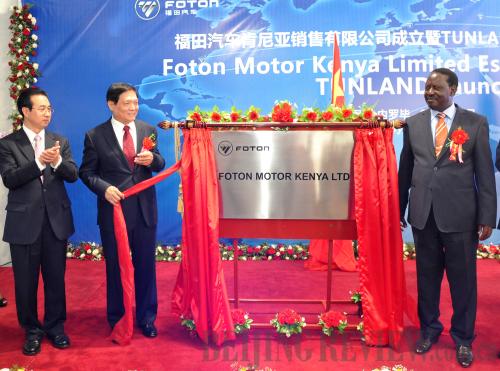|
 |
|
EXPLORING NEW MARKETS: Liu Qi (left), Secretary of the Beijing Municipal Committee of the Communist Party of China, attends the inauguration ceremony of the Beijing-based automaker Foton's Kenya subsidiary in Nairobi on March 26 along with Kenyan Prime Minister Raila Odinga (DING HAITAO) |
Sino-African economic and trade cooperation has made great contributions to infrastructure construction, raising people's living standards and reducing poverty in African countries, which helps establish the necessary economic and human resources foundations for those countries to achieve democracy and good governance. Statistics show Sino-African trade in recent years has contributed to 20 percent of Africa's economic growth. In the final analysis, African development lies in the hands of African people.
Chinese scholars have tried to clarify the Western misrepresentation of Sino-African relations. More and more foreign scholars and foreign media have also spoken objectively about Sino-African relations.
In 2009, a renowned scholar on Sino-African relations, Professor Deborah Brautigam of American University, published her book, The Dragon's Gift: the Real Story of China in Africa, which is based on her 20 years of field survey experience. The book tells many true stories about China helping African countries with social development and poverty reduction. It caused a big shock among academics concentrating on Sino-African relations and China studies. It aroused both appreciation and criticism. Many expressed admiration for the objectivity of the book, but many others treated it with a degree of disdain. This case shows it is much more difficult for Western observers to be objective when discussing Sino-African relations than their Chinese counterparts.
In recent years, I have travelled extensively in Africa as a Chinese scholar. A general impression is that despite criticisms and negative reports on Sino-African relations by the media and NGOs, positive and constructive views are still the mainstream. Most far-sighted African people believe that though China develops natural resources in Africa, it is totally different from the way Western colonists did in the past, which was indeed greedy exploitation. China has provided huge investment and much infrastructure construction for African countries while exploiting resources.
The rapid development of China in the last 30 years shows African countries should no longer regard the Western model as the only solution to their problems. They can look to China and capitalize on the fast-growing Chinese economy to benefit their own development. China's involvement in African affairs is a new and precious opportunity for the development of Africa. African countries should not miss the chance.
As they benefit from trade with China and Chinese-sponsored infrastructure projects, ordinary African people welcome China's growing presence on the continent. Two years ago, on a business trip to Rwanda, I came across a young man in a street of Kigali, capital of the country, and talked with him. The man quoted French Emperor Napoleon Bonaparte as saying that China was a sleeping lion. The Chinese sleeping lion has now awakened and he can hear its roar in Kigali, he said, adding that it signals new hope for his country. In addition to efforts by scholars and the media to dispel misconceptions, the personal experience of ordinary Africans counts when it comes to telling the true story of the Sino-African relationship.
The author is a research fellow with the Institute of West Asian and African Studies of the Chinese Academy of Social Sciences
Email us at: yanwei@bjreview.com | 